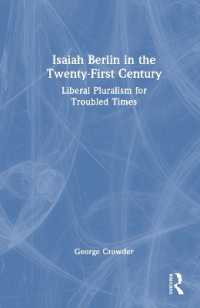Full Description
Looking for a convenient way to build your Russian vocabulary without drills, books, homework or long lists to memorize?
HOW DOES IT WORK?
In this five-hour intermediate level audio course, Michel Thomas Method teacher Natasha Bershadski introduces over 600 new words and everyday phrases and the tools to allow you to create thousands more through the application of simple rules for building more words for concepts, people, places, adjectives and verbs. Learning alongside two genuine students, you will acquire essential language building blocks which allow you to increase your vocabulary in manageable, enjoyable steps by thinking out answers for yourself. You will learn at your own pace, pausing and repeating where necessary. You'll stick with it, because you'll love it.
WHY IS IT SO SUCCESSFUL?
Unlike most vocabulary courses which give you lists of words to memorize, the Michel Thomas Method based Russian Vocabulary Course allows you to further extend your vocabulary by unlocking what you already know. The course is designed to take advantage of the logic and patterns of Russian so you can exponentially build up your knowledge and understanding of the language.
WHO IS THE COURSE FOR?
Whether you have learned from other Michel Thomas Method courses or are simply looking for a new approach to help improve your proficiency, the high-beginner to Intermediate level Russian Vocabulary Course will introduce you to a unique way of acquiring language that will significantly boost your confidence in your ability to speak and understand Russian. It is a Phase 2 course and should be used after you have completed the Intermediate Russian Course or equivalent.
What's in the Course?*
Russian Vocabulary Course includes five audio CDs. The booklet is available to download from www.michelthomas.com.
*Note that the course content is the same as the previously entitled Russian Vocabulary Builder+ course, but does not include a CD-ROM.
LEARN ANYWHERE AND ANYTIME!
Reclaim your pockets of free time to learn a new language! Don't be tied to chunky books or your computer, Michel Thomas Method audio courses let you learn whenever and wherever you want, in as little or as much time as you have.
Contents
: Ways of forming the plural of nouns
: Adjectives with various endings: forming adjectives from English cognates and Russian roots
: More short adjectives (noun-like endings): 'You are right', 'I will do it myself'
: Describing things/places: 'What/what kind of city is it?'
: Giving directions: 'Go to the right/left/straight on'
: Endings/suffixes to form nouns: -tura, -nik, (sputnik), -nost (glasnost), etc.
: The meaning of prefixes used for forming nouns and verbs: po- with verbs = to do a little/for a while (to read for a while - pochitat'); v - in, into; vy - out, out of; pere- (perestroika) = re-, over, etc.
: Families of words formed from the same root: prav, chas, etc.
: Various prepositions: v - in/into; na - on/onto; k - towards/in the direction of; po - along, according to; s - with, etc.
: Expressing one's need, interest, wish: 'I need a car with an air conditioner', 'The director needs a good secretary'
: Giving/asking for advice: 'I advise / recommend you to buy this'
: Buying / paying for things: 'How much is this?'
: Passive constructions: 'I was told/given/shown', 'Where is ... sold?', 'How is it spelled/read?' 'as they say ...'
: 'In order to ... (know /understand, etc.)'
: 'I want you to do this'
: Time expressions: always, often, usually, as usual, just, temporarily
: Food: 'I don't eat meat', 'tea with milk', etc
: Likes and dislikes: 'I like pizza'/ I like the pizza'
: Colours
: Days of the week (+ user guide): 'I don't work on Saturday'
: Months (+ user guide): 'in May'
: Countries (+ the user guide)
: Subjects: 'I'm studying history'
: Transport: 'We are going by car'
: Going verbs: 'I am going to the cinema / I often go to the cinema'
: Visiting places: 'We are going to Moscow', 'an excursion around the city', etc.
: Visiting people: 'I will come to see you (come to you) tomorrow'
: There is something somewhere: 'Is there a shower in the room?'
: The only two irregular verbs: to eat, to give
: Reflexive verbs: to like, to meet, to close
: Figurative use of verbs: 'Time will show', 'This blouse suits you', etc.
: Communicating: 'I spoke with you on the phone', 'I will write (to) you an e-mail'
: Health/parts of the body: 'I have a headache'
: Many new nouns, adjectives, adverbs and verbs will be taught including both cognates and those of Russian origin. We are going to use various mnemonics, such as images and short rhymes, to help to memorise the new words.








